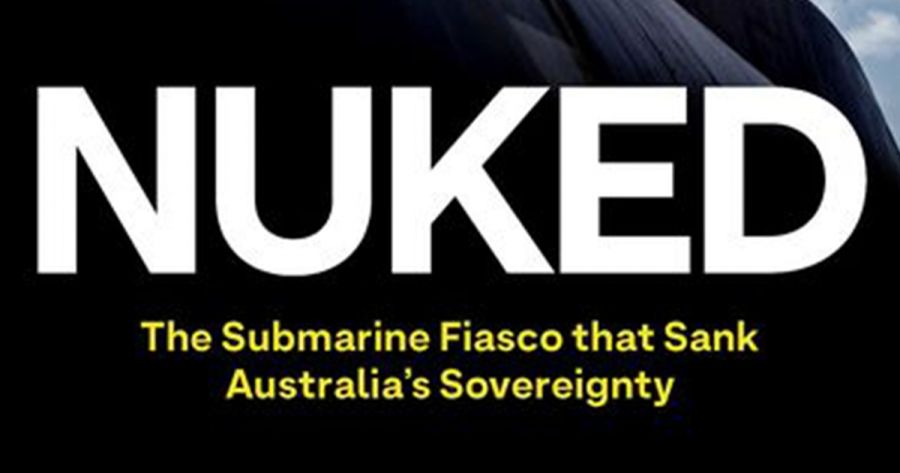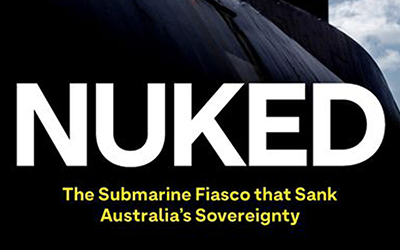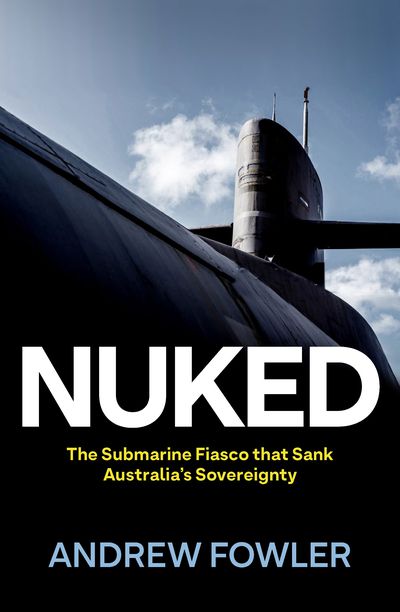
- Free Article: No
- Contents Category: Politics
- Review Article: Yes
- Article Title: The great debacle
- Article Subtitle: Urgent reading for Australian citizens
- Online Only: No
- Custom Highlight Text:
Nuked – a compelling but depressing read – is a deeply researched and strangely suspenseful account of the AUKUS agreement struck between Australian Prime Minister Scott Morrison, British Prime Minister Boris Johnson, and United States President Jo Biden and announced in September 2021; a deal that included supplying Australia with a fleet of nuclear-powered submarines at the staggering cost of $368 billion. Nuked should be compulsory reading for all Australian citizens.
- Featured Image (400px * 250px):

- Alt Tag (Featured Image): Marilyn Lake reviews ‘Nuked: The submarine fiasco that sank Australia’s sovereignty’ by Andrew Fowler
- Book 1 Title: Nuked
- Book 1 Subtitle: The submarine fiasco that sank Australia’s sovereignty
- Book 1 Biblio: Melbourne University Press, $35 pb, 198 pp
- Book 1 Cover Small (400 x 600):

- Book 1 Cover (800 x 1200):

- Book 1 Readings Link: https://www.readings.com.au/product/9780522880311/nuked--andrew-fowler--2024--9780522880311#rac:jokjjzr6ly9m
Initially, as we know, the Australian government, following a ‘competitive evaluation process’ that reviewed submissions from the Japanese, Germans, and French, decided to invite the French Naval Group to supply the required fleet of conventionally powered submarines to Australia. Malcolm Turnbull, prime minister at the time, was pleased at the prospect of working with the French. ‘The French submarine was the clear winner,’ Fowler writes. ‘Turnbull would now relish the sweet taste of success on the world stage – or so he thought.’
Turnbull travelled to Paris and dined at the Élysée Palace ‘on a balmy Parisian evening in July 2017 … under ornate chandeliers’ with French President Emmanuel Macron. In retrospect it is a poignant scene. Turnbull encouraged Macron in his vision of France as a strong ally in the Pacific, and liked to think that Australia could emulate France in forging an independent foreign policy. As would soon become evident, ‘Australia was playing a double game’ and when pro-American Morrison succeeded Turnbull as prime minister in August 2018 he began entrenching US military personnel in the Australian Department of Defence at the highest levels.
Even before the French deal was announced, Morrison and his co-conspirators had set about undermining it and creating in its place the AUKUS agreement to supply Australia with nuclear-powered submarines, partly made in the United Kingdom and partly made or lent by the United States. Fowler suggests the first approaches to the Trump administration were made in October 2020. President Biden was in on the plot from the beginning. An idealistic Democrat, Biden was, if anything, more hawkish about China than Donald Trump. Nuclear submarines were deemed necessary for Australia to take the fight up to China. The aim of the new submarine was to ‘contain’ China – not to defend Australia – and to join the Americans in a revamped strategy of forward defence in the South China Sea.
One legacy of the international drama of AUKUS is the memorable and inimitable line ‘I don’t think, I know’ from Macron, when asked whether he had been deceived by Morrison (dubbed ‘that fella down under’ by a memory-challenged Biden at the time of the AUKUS announcement).
The story combines pathos with bathos. How could a national defence program designed to acquire a fleet of new submarines become so compromised and corrupted by political opportunism and ideological madness? Because this is Australia. ‘Just as Morrison was only too willing to trade Australia’s independence for the chance to win an election,’ concludes Fowler, ‘so too was Labor.’
Labor feared being ‘wedged’ on national security. Now in office, it must manage not only the disastrous nuclear submarine acquisitions program but must also pay the French $835 million compensation for the government’s failure to honour their submarine contract. It also has to deal with another legacy of the Morrison government: the arrival of more B-52s and their nuclear capabilities. ‘US influence [in Australia] is as strong now as it has ever been.’
Framing this tale of intrigue is a larger argument about the sacrifice of Australian sovereignty, the retreat from a more independent foreign policy, and the near total integration of the Australian and US militaries. Morrison the serial deceiver emerges in this sorry tale as an unlikely political mastermind: his ‘brinkmanship and deception worked, with the help of the United States’. All the while he was aided by the seemingly ever-present courtier and ‘vehemently pro-America China hawk’ Andrew Shearer, former national security adviser to John Howard and Tony Abbott, one time director-general of national intelligence, and Cabinet Secretary under Morrison. Fowler quotes a former intelligence officer: ‘The regard in which [Shearer] is held in DC is something else.’
One of Fowler’s themes is the necessary ‘manufacture of consent’ (a phrase of Noam Chomsky’s) in Australia for the AUKUS agreement and the prospect of war with China. Morrison’s legendary marketing skills are cited as crucial to this process, along with the quiescence and connivance of journalists at News Corp and Fairfax Media.
In the most hysterical of interventions, The Age and The Sydney Morning Herald offered a series of articles in 2023 titled ‘Red Alert’ accompanied by graphics depicting scary Chinese fighter aircraft heading south, conjuring the Chinese hordes of yesteryear heading in our direction.
There is clearly a deeper historical context that enabled AUKUS and fuelled the revived China threat narrative on which it rests, one that goes back much further. The China threat narrative was indeed constitutive of Australian nationhood. The newly evoked ‘rise of China’ rests on a deep fear of Asia that saw the self-declared ‘white man’s country’ erect the great white walls in 1901 and Alfred Deakin’s orchestration of the visit of US President Theodore Roosevelt’s Great White Fleet in 1908.
The transnational solidarity of white men in the face of a perceived threat of Chinese global power has a long and dynamic history. More than 130 years ago, in 1893, the English-Australian journalist and politician Charles Pearson predicted in National Life and Character: A Forecast China’s ‘inevitable position as one of the great powers of the world … the preponderance of China over any rival – even over the United States of America – must be overwhelming’. The rise of China as a global power, warned Pearson, would see the ‘white man’s pride of place’ in the world ‘humiliated’. Certainly, Joe Biden’s ‘pride of place’ would not be humiliated. The United States ‘would remain the leader of a unipolar world’ and Australia would do all in its power to support it. Indeed, as Sam Roggeveen (quoted by Fowler) astutely notes, ‘Australia is more committed to US leadership in Asia than the US itself.’
Even as the Labor government wrestles with how to make the disastrous Morrison legacy work, Peter Dutton, Morrison’s successor as Liberal leader, has built on his example, proposing a fleet of seven nuclear power plants across Australia. Nuclear is being normalised.


Comments powered by CComment